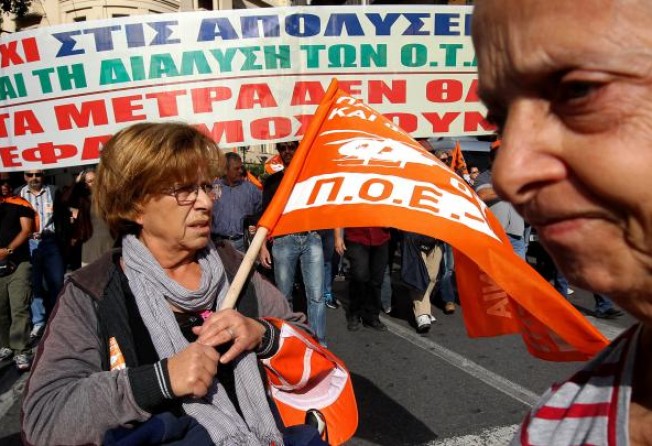Asia stocks down on Greek, India economic woes

Asian stock markets fell on Tuesday, after Europe’s finance ministers postponed approval of an urgently needed aid payment for debt-mired Greece.
The ministers, meeting on Monday in Brussels, gave Greece two more years, until 2016, to cut its deficit and make changes to its economy. But they delayed approval of the next instalment of a huge bailout loan — some 31.5 billion euros (US$40 billion), intended to keep the country temporarily afloat.
Analysts at Credit Agricole CIB in Hong Kong said in a market commentary that the Eurogroup meeting did not “result in an agreement to deliver Greece its next loan tranche but this came as no surprise.”
The European Central Bank, the International Monetary Fund and the European Commission have twice agreed to bail out Greece, pledging a total of (euro) 240 billion in rescue loans. The country has received about 150 billion euros of those loans so far, in exchange for making tough budget cuts and sweeping reforms to its labor market and bureaucracy.
Japan’s Nikkei 225 index fell 0.3 per cent to 8,647.28. Hong Kong’s Hang Seng Index lost 1 per cent at 21,211.94. South Korea’s Kospi dropped 0.7 per cent to 1,887.51. Australia’s S&P/ASX 200 fell 1.1 per cent to 4,399.70.
Markets continued their slump from Monday, when government data released in New Delhi showed India’s industrial production contracting 0.4 per cent in September, far worse than expected. Manufacturing output continued to slump amid signs of weakness in investment and consumer demand.
The results indicate that Asia’s third-largest economy still has a way to go to pull itself out of its current slowdown.
Traders are also keeping an eye on events in Beijing, where the Communist Party’s 18th Congress is in its final days and China’s leaders for the next 10 years are due to be unveiled.
Investors hope the next few days will provide a little more clarity over policy for the world’s number two economy.
US stocks closed nearly unchanged Monday, after a day of uneven trading plagued by investors’ fears about the approaching “fiscal cliff.”
The fiscal cliff refers to government spending cuts and tax increases that are scheduled to kick in at the beginning of the new year, unless a divided Congress and the White House can work out a compromise before then.
“There has been no improvement on the European debt crisis or the US fiscal cliff,” said James Rosenberg, Macquarie Private Wealth investment advisor in Australia.
The Dow Jones industrial average finished down 0.31 points at 12,815.08. The Standard & Poor’s 500 index rose 0.18 points to 1,380.03. The Nasdaq composite index fell 0.61 points to 2,904.26.